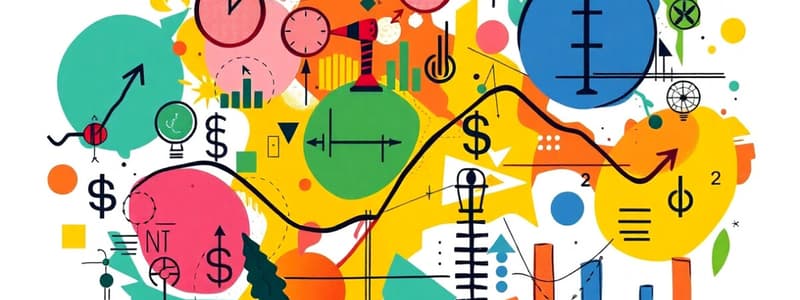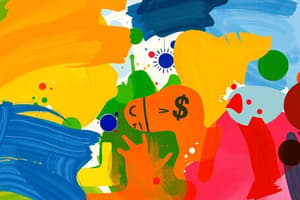Podcast
Questions and Answers
What is economics primarily concerned with in relation to scarcity?
What is economics primarily concerned with in relation to scarcity?
- The elimination of opportunity costs.
- The study of choices made by individuals and societies. (correct)
- The distribution of resources without limits.
- The creation of unlimited wants.
Which term refers to what you must give up to get something else?
Which term refers to what you must give up to get something else?
- Market price
- Opportunity cost (correct)
- Incentive
- Scarcity
What is the main focus of microeconomics?
What is the main focus of microeconomics?
- Government policies on fiscal macroeconomics.
- Overall national economic performance.
- Global economic trends and unemployment.
- Individual and business choices and interactions. (correct)
Which of the following questions is considered a microeconomic question?
Which of the following questions is considered a microeconomic question?
Which statement correctly describes macroeconomics?
Which statement correctly describes macroeconomics?
Why is understanding incentives vital in economics?
Why is understanding incentives vital in economics?
What is a primary characteristic of microeconomics?
What is a primary characteristic of microeconomics?
Which of the following best describes the impact of opportunity cost in economics?
Which of the following best describes the impact of opportunity cost in economics?
What is defined as the highest-valued alternative that must be given up to obtain something?
What is defined as the highest-valued alternative that must be given up to obtain something?
Which of the following best describes a rational choice?
Which of the following best describes a rational choice?
How do choices typically respond in economics?
How do choices typically respond in economics?
What is the concept of tradeoff primarily associated with?
What is the concept of tradeoff primarily associated with?
Which statement correctly reflects marginal benefit?
Which statement correctly reflects marginal benefit?
What is the primary relationship between costs and benefits when making choices?
What is the primary relationship between costs and benefits when making choices?
In the context of economics, what does 'how-much' choices refer to?
In the context of economics, what does 'how-much' choices refer to?
What best defines an incentive in economic terms?
What best defines an incentive in economic terms?
What are the three central economic questions that every economy should address?
What are the three central economic questions that every economy should address?
Which of the following is NOT considered a factor of production?
Which of the following is NOT considered a factor of production?
Which factor of production refers to the 'gifts of nature' used in production?
Which factor of production refers to the 'gifts of nature' used in production?
The human resource that organizes the other factors of production is known as what?
The human resource that organizes the other factors of production is known as what?
In determining who receives goods and services, what primarily influences income levels?
In determining who receives goods and services, what primarily influences income levels?
What encompasses the tools and machinery used in the production of goods and services?
What encompasses the tools and machinery used in the production of goods and services?
Which statement best describes human capital?
Which statement best describes human capital?
What is the primary concern addressed by the 'what to produce' economic question?
What is the primary concern addressed by the 'what to produce' economic question?
Flashcards are hidden until you start studying
Study Notes
Why to Study Economics?
- Scarcity is the fundamental concept in economics: Unlimited wants can't be satisfied with limited resources.
- Scarcity forces us to make choices, leading to the concept of opportunity cost - choosing one option means giving up another.
- Incentives (rewards or penalties) influence our decisions, shaping our choices.
- Economics studies individual, business, government, and societal choices in the face of scarcity and the incentives they face.
What to Study in Economics?
- Microeconomics focuses on individual and business choices within markets, including government influence.
- Macroeconomics examines the performance of national and global economies.
- Microeconomics: Why are people buying more e-books and fewer hard copy books?
- Macroeconomics: Why is the unemployment rate in the United States so high?
- Three central economic questions scarcity forces any economy to answer:
- What to produce?: Determining the goods and services to be created.
- How to produce?: Utilizing factors of production like land, labor, capital, and entrepreneurship.
- For Whom to produce?: Distributing the produced goods and services based on earned income.
- The three main sectors of production: agriculture, manufacturing, and services.
- GDP (Gross Domestic Product): Measures the total value of goods and services produced in a country.
- Factors of production:
- Land: Natural resources used in production.
- Labor: Human effort and time dedicated to production, including human capital (knowledge and skills).
- Capital: Physical tools, instruments, machines, buildings, and infrastructure used in production.
- Entrepreneurship: The human resource coordinating land, labor, and capital.
- Incomes earned from factors of production:
- Land: Rent.
- Labor: Wages.
- Capital: Interest.
- Entrepreneurship: Profit.
How to Study in Economics?
- The Economic Way of Thinking: Six Key Ideas
- Every choice involves a tradeoff, resulting in an opportunity cost.
- Rational choices compare costs and benefits, aiming for the greatest benefit over cost.
- Benefit is the gain or pleasure derived from something, defined by individual preferences.
- Cost is the opportunity cost - the highest-valued alternative sacrificed to obtain something.
- Most choices involve incremental "how-much" decisions made at the margin (comparing marginal benefits and costs).
- Choices respond to incentives - changes in marginal benefits or costs influence our decisions.
- Example: Studying versus Having Fun
- Choices are tradeoffs, like studying instead of having fun.
- Example: Opportunity Cost of Going to a Movie
- The opportunity cost of a movie is the highest-valued alternative - studying, working, etc. - forgone to attend.
- Example: Buying Oranges
- Marginal benefit and cost determine how much you buy. You'll buy more if the marginal benefit (satisfaction from an additional orange) exceeds the marginal cost (price of an orange).
- Examples: Price Offers
- Incentives influence choices. Lower prices encourage more purchases.
Studying That Suits You
Use AI to generate personalized quizzes and flashcards to suit your learning preferences.




